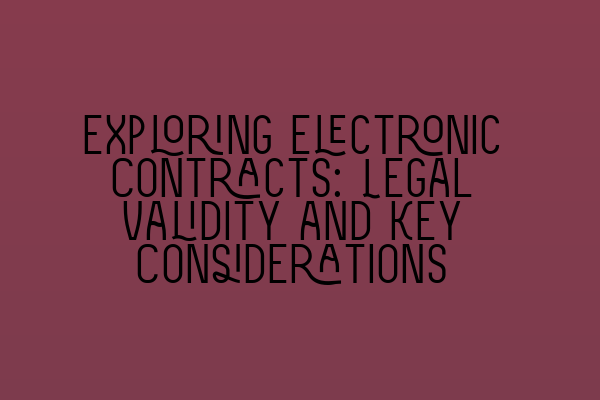Exploring Electronic Contracts: Legal Validity and Key Considerations
In today’s digital age, the use of electronic contracts has become increasingly prevalent. The convenience and efficiency of conducting business transactions online have led many companies to adopt this method of contract formation. However, it is essential to consider the legal validity of electronic contracts and the key considerations that come with them. In this blog post, we will explore the legal landscape surrounding electronic contracts and provide valuable insights for individuals and businesses entering into such agreements.
Legal Validity of Electronic Contracts
The validity of an electronic contract often hinges on the applicable legislation and the intention of the parties involved. In many jurisdictions, including the United Kingdom, electronic contracts are legally enforceable, provided certain criteria are met. The UK Electronic Communications Act 2000 and the Electronic Signatures Regulations 2002 establish the legal framework for electronic contracts and electronic signatures in the country.
To ensure the legal validity of an electronic contract, there are several key considerations to keep in mind:
1. Consent and Offer: Just like traditional contracts, electronic contracts require offer and acceptance. The parties must agree to the terms and conditions of the contract, and this consent must be clearly evidenced in the electronic record. This can be achieved through electronic signatures or other means of authentication.
2. Signature Authentication: The authenticity of electronic signatures is crucial in determining the validity of an electronic contract. Electronic signatures can take various forms, such as typing names, clicking checkboxes, or using encrypted digital certificates. It is important to use secure and reliable methods to ensure the integrity and non-repudiation of electronic signatures.
3. Accessibility and Readability: Electronic contracts must be easily accessible and readable by all parties involved. It is essential to use file formats that are universally accessible, such as PDF or HTML. Additionally, the font size and formatting should be clear and legible to avoid any disputes regarding the terms and conditions.
4. Recordkeeping and Retention: Adequate recordkeeping is essential when it comes to electronic contracts. Parties should retain copies of the electronic records in a secure and tamper-proof manner. This ensures that there is a reliable audit trail in case of any disputes or legal challenges.
5. Jurisdiction and Governing Law: Parties entering into electronic contracts should specify the jurisdiction and governing law that will apply to the agreement. This helps determine the applicable legal framework, as different jurisdictions may have varying regulations regarding electronic contracts.
By taking these key considerations into account, individuals and businesses can ensure the legal validity of their electronic contracts and minimize the risk of disputes or challenges.
SEO Keyword Integration:
To further expand your knowledge about SQE contract law, you may find the following related articles useful:
– SQE 1 Practice Exam Questions
– SQE 1 Practice Mocks FLK1 FLK2
– SQE 2 Preparation Courses
– SQE 1 Preparation Courses
– SRA SQE Exam Dates
Conclusion
As technology continues to advance, electronic contracts have become a popular choice for individuals and businesses. Understanding the legal validity of these contracts and the key considerations surrounding them is essential for ensuring enforceability and avoiding potential legal pitfalls. By following the guidelines outlined in this article, parties can confidently enter into electronic contracts knowing that their agreements are legally valid. Should you require further guidance or assistance in navigating the complexities of electronic contracts, it is advisable to seek professional legal advice.
Please note that the information provided in this blog post is general in nature and should not be considered as legal advice. Different jurisdictions may have specific requirements and regulations regarding electronic contracts. It is crucial to consult with a qualified solicitor or legal professional for personalized advice tailored to your specific circumstances.
